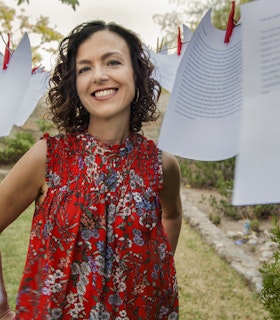Rosa Alcalá

Artist Statement
Poetry arose for me from the particular situation of being an interpreter for my working-class immigrant parents, often in institutional settings where the official language, English, was several pay grades above the Spanish spoken at home. In that negotiation of dictions and desires across differing manifestations of authority—and the split loyalties and responsibilities to each—I became aware of conflicting cultural and class perspectives embedded in ways of speaking. I also began to experience words not as facts but as embodied expressions given meaning through accent, gesture, facial expression, and intonation. This made me the poet I am today, one who dwells in the space of negotiation between family and institution, between ways of speaking and being, to understand what is lost there or gained. And, free now from the duty to external aims (file the unemployment claim, convey a diagnosis), I let the bodies of words—across and within languages—surprise me with their plasticity and potential, their kinship and irresolute difference. I let them lead me to places of discovery, where neither family nor institution administrates, where I might trace the unsayable or forge a new belonging.
- December 2022
Biography
Rosa Alcalá is a poet and translator whose work is an inquiry into, and translation of, the autobiographical. She explores the unraveling and reweaving of identity and kinship that immigration can set in motion, as well as the complexities of the “mother tongue.” She also writes about motherhood, gender, labor, class, and money.
Her forthcoming book YOU (Coffee House Press, 2024) addresses versions of a former self to understand the ways fear shapes the lives of girls and women and is passed from mother to daughter. In MyOTHER TONGUE (Futurepoem, 2017), she problematizes the term “mother tongue,” unpacking the complex and often uneasy relationships immigrants and their children have to the languages spoken at home, versus those spoken at school or work. Her earlier poetry books are The Lust of Unsentimental Waters (Shearsman Books, 2012), a meditation on translation, and Undocumentaries (Shearsman Books, 2010), which documents a shift in class identity.
Alcalá’s poems have appeared in The Nation; Harper’s Magazine; Poetry; The Best American Poetry; American Poets in the 21st Century: Poetics of Social Engagement, edited by Claudia Rankine and Michael Dowdy (Wesleyan University Press, 2018); and other magazines and anthologies. She has read throughout the United States and in Chile, Colombia, Mexico, and Georgia.
Alcalá’s translation and editorial work includes New and Selected Poems of Cecilia Vicuña (Kelsey Street Press, 2018) and Spit Temple: The Selected Performances of Cecilia Vicuña (Ugly Duckling Presse, 2012). She has been recognized with a National Endowment for the Arts Translation Fellowship (2015) and was a runner-up for the PEN Award for Poetry in Translation (2013).
A recipient of an Allen Ginsberg Visiting Fellowship from Naropa University’s Jack Kerouac School of Disembodied Poetics (2017), Alcalá has also been awarded writing residencies at Yaddo, Saratoga Springs, NY; MacDowell, Peterborough, NH; and Fundación Valparaíso, Mojácar, Spain.
Alcalá holds a B.A. from William Paterson College, an M.F.A. from Brown University, and a Ph.D. from the University of Buffalo. Since 2004, she has taught in the Department of Creative Writing and its Bilingual M.F.A. Program at The University of Texas at El Paso, where she is the Peter and Mardee de Wetter Endowed Chair in Creative Writing. Alcalá is also a consulting editor for the University of Chicago Press’s Phoenix Poets series.